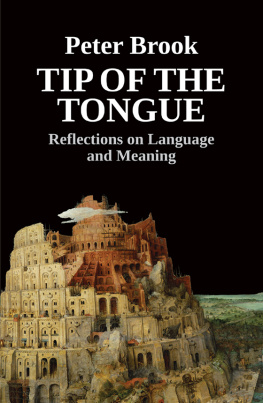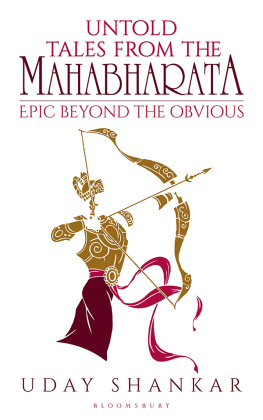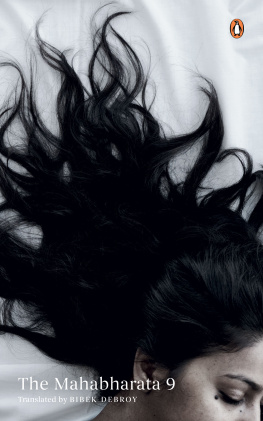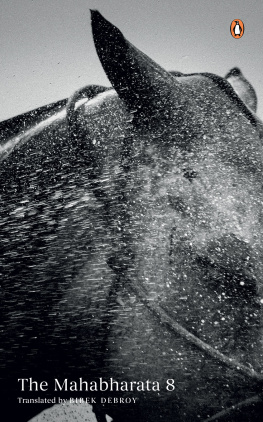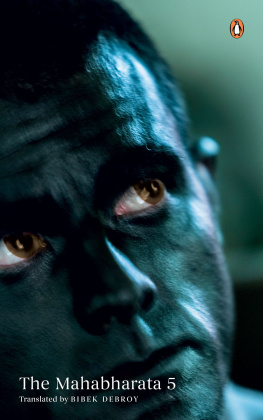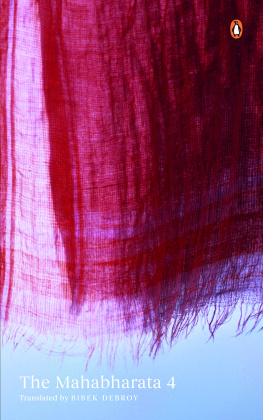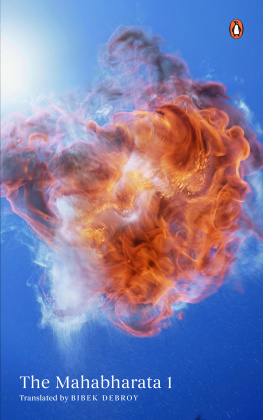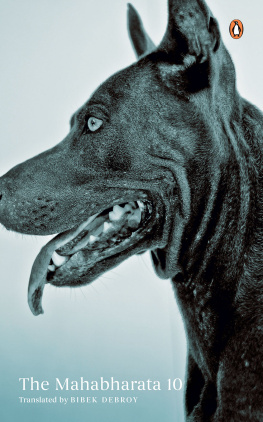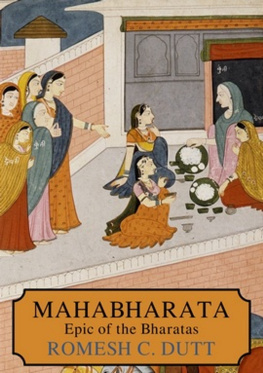BIG BHISHMA IN MADRAS
CONTENTS
ACKNOWLEDGEMENTS
These notes were made between 1982 and 1985 during our first three travels through India in search of the Mahabharata . As my original sketches mysteriously disappeared in the course of their travels, I have made new ones for this edition.
All this is thanks to Peter Brook who knows how to make possible the impossible.
TRANSLATORS NOTE
When I met Jean-Claude Carrire at his home in Paris, it was to discuss his coming to Delhi where he was going to do a workshop for us, for my Asian film journal Cinemaya , on script writing. It was a major event which was to be held at the Cultural Centre of the French embassy which, in those long-ago days, had a small auditorium where we had shown films and held different workshops over a number of years. Jean-Claude Carrire agreeing to come and do a workshop was a huge achievement.
When we met and discussed this in Paris, he presented me with his book A La Recherche du Mahabharata . I had not seen the 9-hour play Carrire had written and Peter Brook had presented in France. The film had not yet been made.
I read the book while I was still in Paris and went back to say to Jean-Claude that it MUST be translated into English. He just laughed and said, Why dont you do it, Aruna.
It was quite a challenge but I thought why not. It should be read in India and elsewhere by English-speaking people because it is such an inspiringly written account of something most people outside India, do not know about. And within India it gives such a moving insight into the role of the Mahabharata in our lives.
I returned to Delhi a few days after meeting Jean-Claude, and started the translation immediately. I finished it within the next couple of months. When Jean-Claude arrived in Delhi a few months later to conduct the workshop we had planned, he read it and said, It reads better in English than in French.
Incorrigible as I am, my response was, Of course. I know English better than you know French! It got published very quickly and launched by the then Ambassador of France in India, Bernard de Montferrand, at a lovely ceremony at the French embassy.
It was a very happy moment for me and the book did get good reviews and good sales.
Now I am delighted a new edition is being published by Speaking Tiger all these years later. Jean-Claude Carrire had done a number of sketches for the first edition but now, he has done new ones for this edition which give a new life to his story and the story of his travels through India with Peter Brooke, in search of the Mahabharata, in a very evocative and appealing manner. Hopefully, it will also lead to the film being shown again.
ARUNA VASUDEV
New Delhi, October 2018
FOREWORD
Jean-Claude Carrire was the main reason I stuck out what turned out to be a life-changing five-year adventure for me.
It was April 1984. I was five months pregnant with my first child, and had been in bed with jaundice for four months. That is how Peter Brook, Jean-Claude, Marie-Hlne and the two designers, Chloe and Pippa, first saw me, at my home in Ahmedabad. Two days earlier I had received a telegram from my friend, the cultural attach at the French embassy in Delhi, saying that they wanted to see me. I was surprised and presumed it was for some minor role. I didnt know Peters work but had read news reports of his casting quest in India. Within ten minutes of our meeting, Peter asked me to audition for the role of Draupadi. I was flabbergasted. Draupadi had always been my favourite character, feisty, unyielding, vocal. There was a catch, of course, and that was that the play was in French (I didnt know the language) and that the contract would be for two years. I was about to be a mother, had just started a publishing company with my then husband, and the prospect sounded frightening.
However famous Peter was, I knew that I had to like his work before even considering the offer. In New York a week later I watched his Carmen , and was blown away. I told Peter I would audition. I was flown to Paris and made to do an audition at two in the morning at Peters theatre, the Bouffe du Nord. I was offered the role, three weeks off early rehearsals to have my baby, and that was that.
Moving to France with a tiny baby, setting up home for the first time, not speaking the language, in the midst of the worst winter in years, with frozen piping in my apartment, and a rehearsal space which was an eight-floor walk up, was hard. And I disliked the atmosphere of the rehearsals. Every other actor was a star theatre actor from one country or another. I was a dancer. I was the only Indian and the only one amongst the actors who knew and had read and reread many versions of the Mahabharata . I had problems with women being interpreted as shrews. (There are no shrews in the Mahabharata , I told Peter, only Shaktis!) I disagreed with the way many scenes were interpreted. And I only had Jean-Claude to turn to, a man in charge, English-speaking, encouraging and understanding of my loneliness and despair.
I learnt French. Began to speak it well, in fact. I learned to hold my own. I made good friends. I started unpeeling myself like an onion as an actor. I learned to be knowledgeable enough to be able to put up cogent arguments for why I thought certain scenes were wrongly interpreted. Previews started. I found women of all kinds reacting positively to my interpretation of Draupadi. We started touring the world. Then came the English version, then the film. And five years had gone by.
All the performance work I have done since, the work I create to bring about changes in mindsets and attitudes, were born in my experience playing Draupadi to diverse audiences. The confidence I got as a storyteller also comes from there. And through it all Jean-Claude remained a friend to turn to, a shoulder to cry on, and a buddy to celebrate with.
This book has been a fascinating read for me too because it predates my adventures with the troupe. And his squiggles are always a delight, capturing as they do, the prana of the figure he has drawn.
MALLIKA SARABHAI
27 September 2018
Arrivals and Departures
1982
W e knew the poem, we wanted to see the country. India. We had read the Mahabharata at length, Peter in English, Marie-Hlne Estienne and I in French, in Hippolyte Fauches version. After listening to Philippe Lavastines long and marvellous accounts; after one year of readingin Paris, while travelling, everywhere. Another year of reading together, around a table. Comparing versions, eliminating certain digressions, some preliminary accounts (Yayati, for example, not without regret).
The Mahabharata had been, for eight years, our constant companion. I took it with me to Mexico when I worked with Buuel (Portols, the Spanish filmmaker). Always one or two volumes in my suitcase, since the whole work is impossible to carrysixteen times the size of the Bible! I remember a day in New York in 1983, auditioning tenors for Carmen . Seated beside Peter in a theatre. At an audition one knows immediately whether a singer is good or not. Then, out of politeness, one listens for another ten minutes. Peter leaned slightly towards me and whispered something about Karna, Dont you think that?... I dont remember exactly what it was about. But he could think only of that. I, too.



